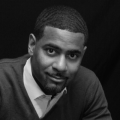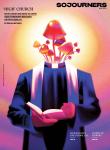The writer James Baldwin stated in 1962, “It is, alas, the truth that to be an American writer today means mounting an unending attack on all that Americans believe themselves to hold sacred.”
It is the truth that to be a person of faith in America today is to recognize that America desires Jesus slogans over morally grounded Jesus-inspired action.
America as a nation stands on the precipice of what Rev. William Barber II refers to as “the third reconstruction,” a moment in history when the zeitgeist of the nation clashes with the myth of our history. The nationwide unrest, witnessed from Maine to California, is part of America’s reckoning with a lie this nation has refused to acknowledge. As a nation, racialized thinking and white supremacy is part of not only our history, but saturates all of our institutions. I will not bore you with historical details, but scholars such as Michelle Alexander, Ibram X. Kendi, Carol Anderson, and Richard Rothstein make the case powerfully that America has a spiritual malady supported by institutions that either aggressively promote these ideals or willfully ignore their reality. Our national reckoning and possible reconstruction rest at the epicenter of this myth many today courageously seek to exorcise from our body politic.
Portland and cities such as Chicago, where I live, work, and serve, offer an additional challenge to people who want to be free of the lie that comes with loving whiteness over ethnicity and power over democracy. One must understand whiteness is a socially constructed identity, created in reaction to Blackness. Ethnicity, on the other hand, is a culturally rooted identity of shared story, music, and usually, good food. One quickly sets up a hierarchy. The other sets a table and tells stories enabling people to struggle to find common chords in the collective human enterprise.
Federal troops being sent to Portland, and possibly Chicago, complicates the movement for Black lives. The case of Portland serves as a map to help us avoid marginalizing Black voices: In a city that is 77 percent white, where a coalition organized and led by Black activists is speaking directly to America’s lie of equality, we witness the stories Black anguish quieted by those on the Left and the Right along with media commentators. Federal troops in camouflage, without insignia, have engaged white protesters in a manner Black people have screamed about to this nation since the early formation of policing, modeled after southern slave patrols.
White protesters in Portland were given a glimpse of how Black lives do not matter in the face of state-sanctioned violence. As a result, protests swelled in Portland and news coverage increased — not to highlight racial inequity, Black pain, or the racialized deployment of the police, but instead to highlight the horrific federal transgression of constitutional authority. The heightened sensitivity was again connected to America’s historical lie reasserting itself. White citizens were being treated as “three fifths” of a person. The outrage shifted from policy, defunding the police, reparations, courageous conversations on race, repentance, and what does justice look like in America to legitimate constitutional questions that again failed to acknowledge Black suffering. Republicans using the Lee Atwater and Karl Rove handbooks seized upon this moment to speak of “outside agitators” to frame an “alt-right” interpretation of the protests. This strategy is not unlike the propaganda deployed against Martin Luther King Jr. by George Wallace in Alabama. America’s racial lie has an undercurrent that does not believe that “three-fifths semi-citizens” have the intellectual capacity for free agency and must be under some “sinister” influence from the Left.
Again, Black suffering was silenced and white discomfort and pain was lifted up in the process. People of faith, those who claim Jesus, have a moral obligation and spiritual call to resist participation in this complicated social sin. How people of faith answer in this moment will determine the future of the American church. Will believers in Jesus decide to be chaplains for the empire or prophets to the nation?
Chaplains are in a position to advise those in power, but the proximity to power recuses them from the call to resist, rebel, and join revolutionary movements. The prophet, on the other hand, seeks to disrupt power and has a heart that holds the memory of Rachel’s tears, the orphan’s death, and the poor’s exploitation as sacraments for a faithful journey. People of faith, in this moment, must decide: Shall we follow a dark-skinned Palestinian Jew, who cast his lot with those who had their backs against the wall, or will we march with the advisers of Herod, hoping our presence is enough to keep an arrogant Herod from harming all the Hebrew children?
The deployment of federal troops as a Roman legion seeking to posses the streets of Portland and Chicago must be resisted by people of faith, who have been baptized by the radical notions of Jesus who lived, loved, and ministered with and to the disinherited. How we respond to this moment will determine the future of the American church. Shall we be chaplains or prophets? The question is upon us. What shall be your answer to this moment of history?
Got something to say about what you're reading? We value your feedback!








